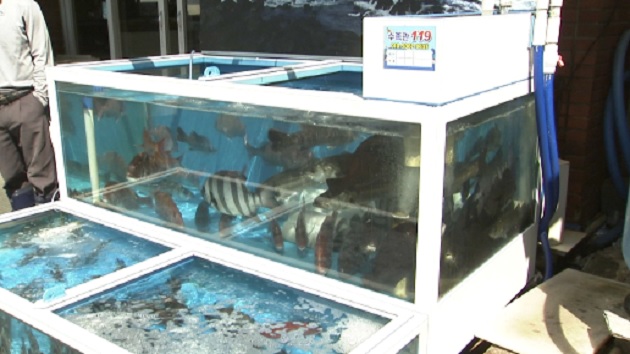
As Japan has announced it will release radioactive water from the wrecked Fukushima nuclear power plant into the sea, safety concerns are growing over contaminated fish caught in waters around Japan.
Most local seafood restaurants sell fish imported from the country, but the province’s management of a country of origin looks insufficient.
Todd Thacker reports.
Report
This is a seafood restaurant street in Jeju City.
Various fish that are popular with diners, including (우럭) rockfish, (돌돔) rock bream and (다금바리) saw-edged perch, swim in fish tanks.
The names of the country of origin are listed, though fish caught in Korea and Japan share a tank.
As Japan has recently announced it will release radioactive water into the ocean from the Fukushima nuclear power plant, safety concerns are growing over contaminated fish caught in Japan.
However, at local restaurants the sale of fish caught in Japanese waters remains unrestricted.
Experts say that the supply of domestic seafood cannot meet demand.
Most local seafood restaurants sell fish caught in Japanese waters.
As of now, over 90 percent of offseason (벤자리) threeline grunt, (돌돔) rock bream and (벵어돔) black sea bream are imported from Japan.
Japan’s advanced aquaculture industry produces fish similar in appearance to ones caught in Korean waters.
Consumers can barely tell the difference between Korean and Japanese sourced fish.
Most Japanese marine products consumed in Jeju are imported through ports at (부산) Busan or (통영) Tongyeong.
Then, local wholesalers supply the Japanese seafood to restaurants.
Due to the complex and lengthy distribution process, it is possible for fish caught in Korea and Japan to intermingle in tanks before they arrive at restaurants.
Provincial officials meanwhile have yet to pin down the details of Japanese seafood imports entering the local market.
As consumers’ concerns about Fukushima and radioactive pollution increase by the day, stricter oversight on seafood imports and places of origin are clearly needed.
Todd Thacker, KCTV





